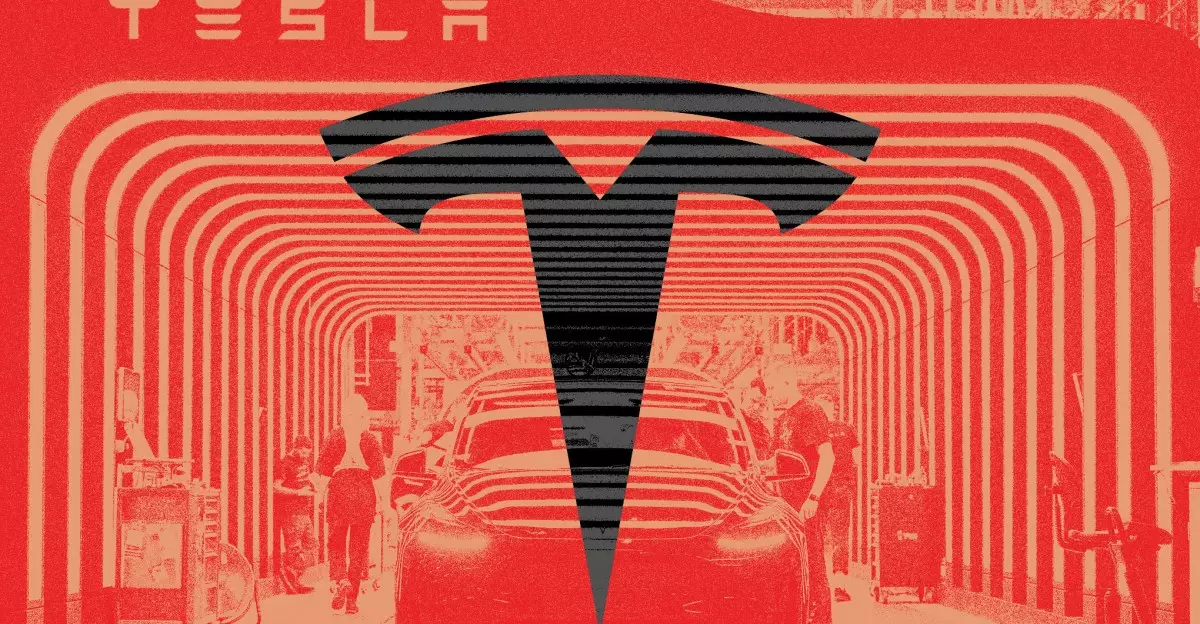Tesla’s recent sales data in Europe paints a grim picture for the electric vehicle titan. With a staggering 50 percent decrease in vehicle registrations, comparisons to previous years show a significant downturn that cannot be ignored. While the larger market for electric vehicles is booming—new battery-electric car sales soared by over 26 percent—Tesla seems to be losing its foothold. This contrast highlights a critical challenge for the company: not the decline of electric vehicle interest, but a crumbling brand reputation and decreasing market share in a rapidly evolving industry.
In April, Tesla recorded a mere 7,261 new vehicle registrations, almost halving its numbers from the same period last year. This decline comes despite expectations surrounding the newly refreshed Model Y, which was anticipated to reinvigorate interest and attract new customers. Instead, the new model has not yielded the desired results, raising concerns about Tesla’s marketing strategies and product positioning in an increasingly competitive landscape.
Competition Breeds Challenges
The electric vehicle market is no longer a niche territory; it is a battleground teeming with innovation and fierce competition. Tesla’s early dominance is now being challenged by a rush of formidable rivals, particularly European and Chinese manufacturers. These competitors are leveraging advancements in technology and aggressive pricing strategies to lure customers away from Tesla. With the European automotive landscape churning out compelling alternatives that rival or surpass Tesla’s offerings in performance, features, and price, the company must adapt quickly to maintain relevance.
Moreover, as Tesla grapples with dwindling sales, competitors are not only closing the gap but are also beginning to capitalize on the shortcomings of the Tesla brand. The emergence of local players in the European market suggests that customers are increasingly inclined to explore homegrown alternatives that may offer a more appealing balance of performance and price, contributing to Tesla’s ongoing struggles.
The Impacts of Elon Musk’s Public Persona
Elon Musk’s charismatic yet polarizing public persona has always been a double-edged sword for Tesla. While his entrepreneurial spirit has drawn significant attention and investment to the company, recent controversies arising from his political affiliations and outspoken demeanor have begun to backfire. Polls indicate a growing public discontent toward Musk himself, which has translated into skepticism regarding Tesla as a brand. Currently, a majority of voters express an unfavorable view of Musk, signaling a potential disconnect between his personal brand and the corporate image of Tesla.
This schism raises questions about the viability of Musk’s brand association with Tesla. Historically, the intimate link between Musk and his ventures was seen as an asset, allowing consumers to engage with the man as much as the products. However, with customer sentiments shifting, it appears that maintaining such a tight bond may no longer serve the company’s best interests.
Internal Focus Amidst External Pressures
Acknowledging the turbulence within the company, Musk has proposed an increased focus on Tesla’s core operations rather than getting mired in political affairs. While this sounds like a positive step, it remains to be seen whether this shift will manifest in meaningful changes for the brand. Critically, Musk’s vision includes ambitious projects in AI and automation, yet the pressing need is for Tesla to address immediate market challenges that are jeopardizing its competitive edge.
At the recent quarterly earnings call, Musk remained optimistic that sales would rebound post-refresh of the Model Y. However, the efficacy of this strategy is unproven at this point, and lingering doubts about leadership transparency and responsiveness to market needs could further mar consumer trust. Ultimately, the grasp of consumer sentiment is delicate and can pivot quickly based on perceived failures or successes.
In a rapidly evolving electric vehicle market where consumer options are growing and enthusiasm approximately tracks brand perception, Tesla must navigate its future with more caution than ever before. The combination of declining sales, rising competition, and public unrest towards its CEO calls for a strategic reevaluation to regain its foothold. Emphasizing innovation and aligning leadership dynamics with consumer expectations may be crucial as Tesla ventures into a new chapter fraught with potential but equally laden with challenges.

